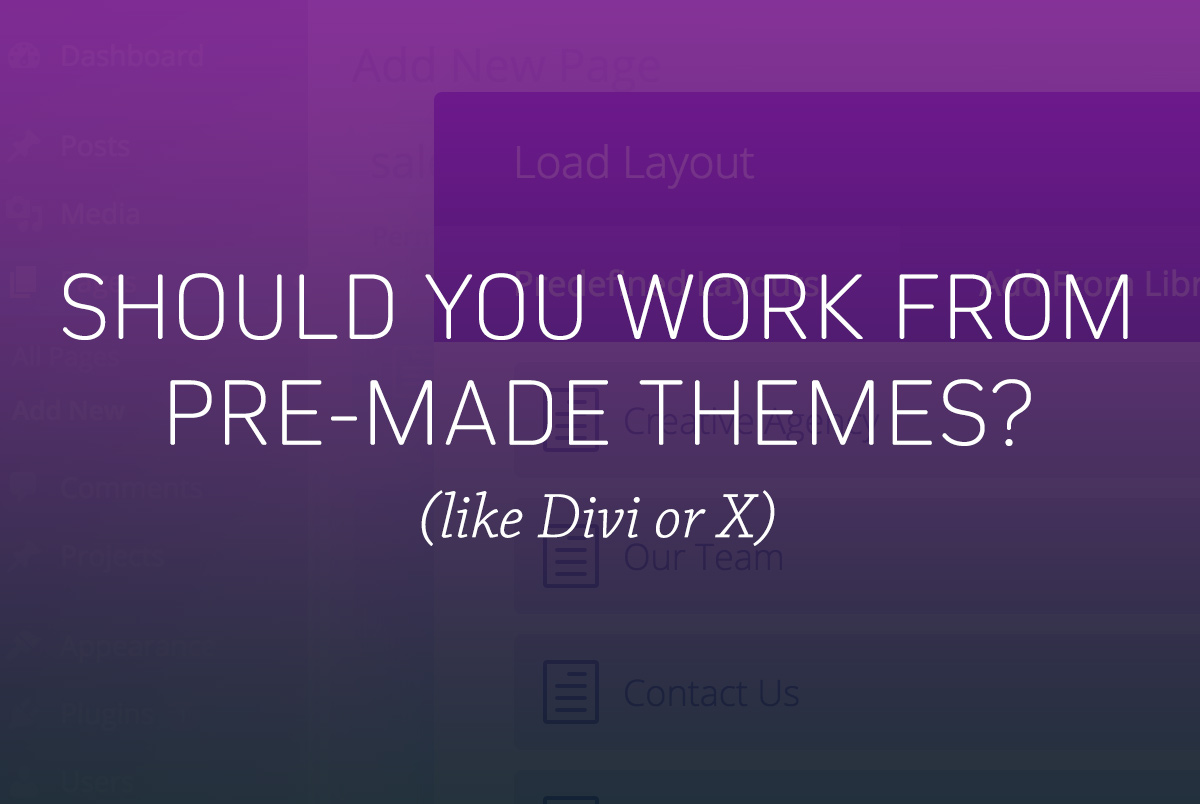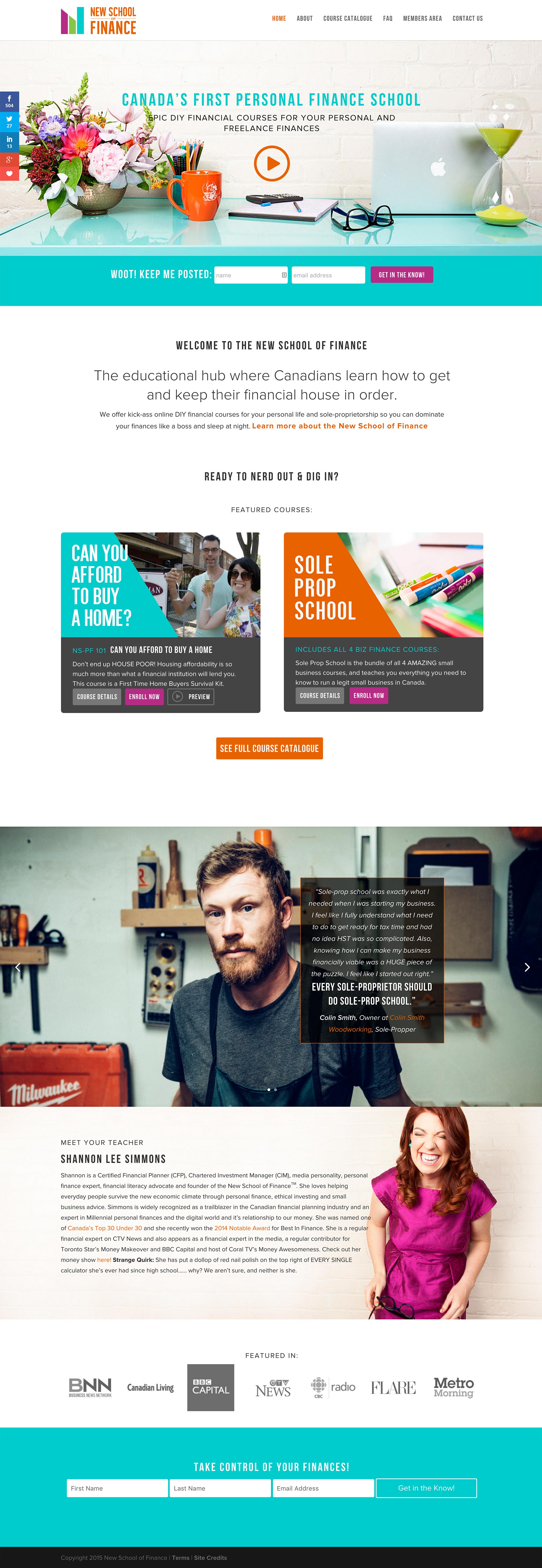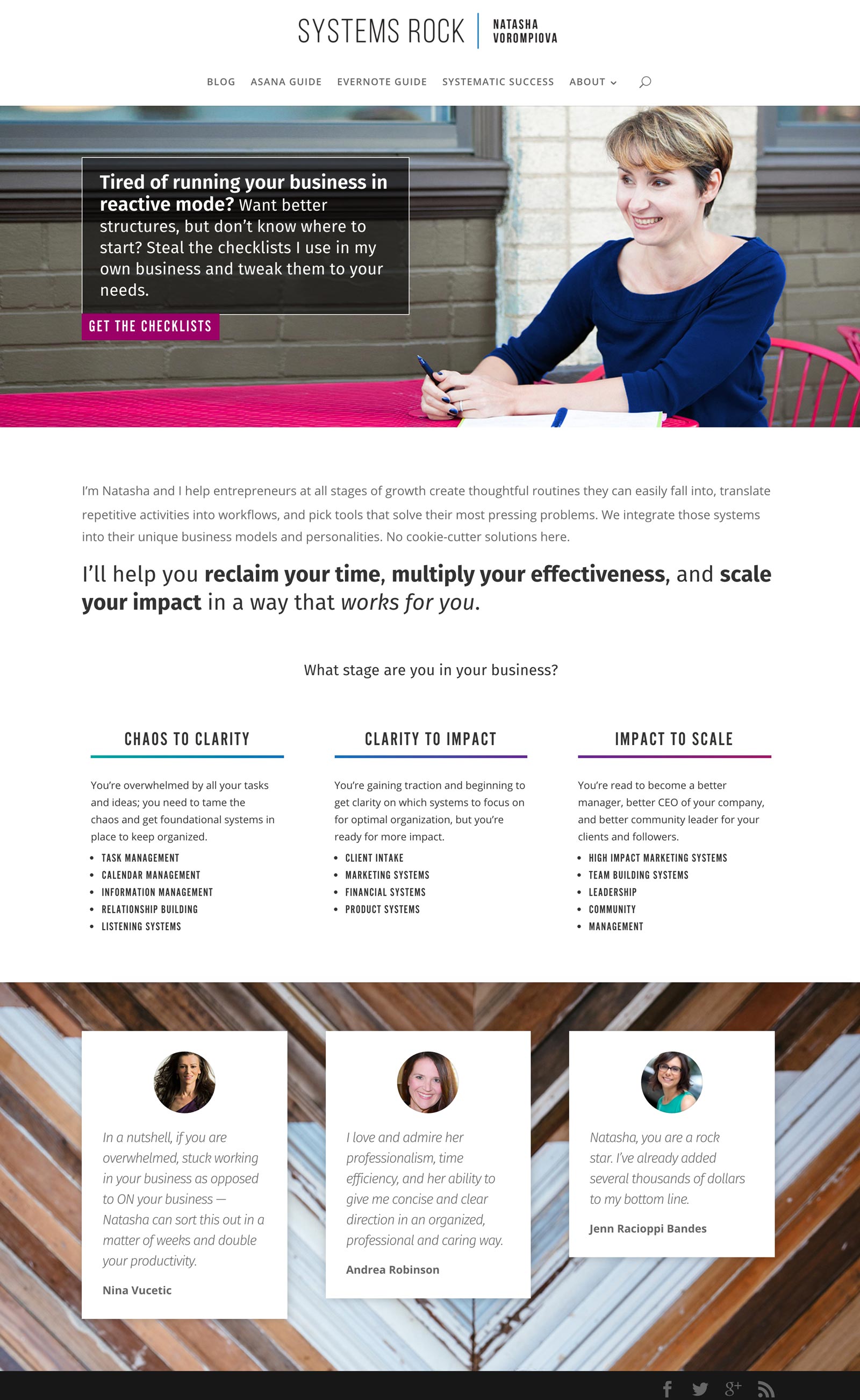
Here’s my (potentially controversial) opinion on working with themes and builders.
To paraphrase a great question I got from one of my Digital Strategy School students:
“I see many people using drag and drop builders for clients who can’t quite afford a custom themed service. But I’ve had reservations.
Basically, I’m a purist and all that bloat makes me not happy…plus the fact that if they want to move onto something else later the shortcode mess afterwards hurts my brain… plus the fact that the client can seriously fudge up their layout and functionality and USEFULNESS of their site we so carefully planned out…
So, what’s the upside? Is it the time factor? Is the wiz-bang factor? Am I being too precious about it all and just do what works?
*hmmpf*”
EXCELLENT question, and I do have opinions about this.
And you are more than welcome to disagree with me 🙂
My answer to the question above is this:
I’ll begin by saying that I don’t believe there is one magical way to build a website.
There are “best practices,” of course, and as much as possible I try to stay on top of what’s happening in the intersection of conversion-focused and empathy-driven website design.
I used to build all of my clients’ websites from scratch, and this was extremely time-consuming. I spent MANY years learning how to work with HTML, CSS, PHP and WordPress, and I still don’t really consider myself “a developer.”
I started using the Divi theme a few years ago, and it has become one of my go-to themes of choice for a number of reasons.
Using Divi as a starting point has probably reduced my design and development time to less than a quarter of what I used to spend. No joke. A 75% time savings.
This means I can build websites much faster, and focus on really diving into strategy + adding more value for my clients.

Your clients don’t “benefit” from you taking the hard or long way.
They need a site that works for them and their business.
YES there are trade-offs.
I HEAVILY customize my Divi builds via CSS, and I pre-build a number of templates for them with built-in IDs and Classes, so that it picks up my custom styling. Now instead of HTML/PHP, i’m using CSS to get it to really look the way I want.
Is my code spectacularly optimized for page load times? No.
Are my designs pixel-perfect? Heck no.
But here’s the thing:
No one is paying you for your time spent on your computer, banging on keys, staring at code.
I don’t sell “pixel perfect design,” or “responsive websites,” or super-fast page load times.
That’s not what I sell, and it’s not what I get hired for. So why would I not do whatever I need to do to minimize the time I’m spending assembling my clients business tools?
(To be clear, I’m not talking about doing a shitty job, or cutting corners. I’m talking about making the most informed choices for my clients. There are times where an ability for my client to update is more important than perfect lines of code. There are always trade-offs with each and every approach.)
What do I actually bring to the table for my clients?
My strategic insights. Launch support. Content Strategy. Beautiful Websites with well-planned user experiences. Online course and program support, including launch strategy, content wrangling, marketing roadmaps, audience building, sales page design and copywriting, etc.
Those are the things that help my clients grow their businesses.
It would be extremely difficult to run a profitable Strategic Consulting business if I were continuing to build every single website from scratch.
Is the code sometimes bloated? Yes.
Does it still load fast enough, and give the client the flexibility they need? yes.
Does it sometimes require tweaks and updates? yes.
Does it allow me to create totally custom designs? yes.
Now it’s easier than ever for my clients to work with and edit their own sales pages (and other pages), while I can focus on the strategy and overall brand look/feel without feeling like a pixel-pushing monkey.

I think often the tendency (as designers) is that we want to restrict what our clients are able to do, when really we need to design and plan for a multitude of scenarios to EMPOWER them to be able to do what they want to do.
This kind of freedom that using a robust pre-made them like Divi or X-theme allows is worth any of the drawbacks I’ve seen so far.
I don’t want to restrict what my clients can do with their sites – I want it to grow with them as they grow.
Does every website I build look the same? No.
Divi is a structural framework that enables me to build what I need to build quickly, while my years of development experience allows me to use CSS to create incredibly custom experiences for my clients.
Using SASS + Divi has been a huge game-changer for me personally, and is what has allowed me to really focus on planning and strategy!
I still believe that developers have a huge advantage; knowing how something truly works is incredibly powerful. Some of you out there can build custom sites faster than others can customize a pre-existing framework (my partner Ben is one of these people!). That is awesome!
But do you need to take the hard way out of a misplaced sense of loyalty to code?
I don’t believe so.
I recently spoke at the Starting Point Student Entrepreneurship Conference in Nova Scotia, and I had the pleasure of attending a talk by Ricky Neckles about putting your business on autopilot. He essentially said: you don’t get a medal for re-inventing the wheel every time.
Use existing frameworks. Start from what exists.
If it makes sense to start from scratch, do it. But make sure you’re doing it for the right reason; because it makes sense for the project.
“Website design” on it’s own is quickly becoming a commoditized service. We are constantly needing to re-invent ourselves as various technical skills become commoditized. This is the nature of the web; it’s constantly changing, and we’re constantly needing to adapt (or we go hungry)!
I believe it will become less and less practical to build from scratch (though not always).
This of course depends on your market, industry, and budgets.
Fighting this will be comparable to music companies trying to fight digital music downloads.
Looking at a website as just one part of a greater business ecosystem is what will give future designers an advantage. Don’t waste your time taking the long way: spend your time learning about and understanding digital marketing, content strategy, audience building and growth.
Help people learn how to use their websites to their advantage.
Perfect code and beautiful designs alone do not grow businesses.
And? It’s really hard to outsource strategy…
I’m curious to know your thoughts! Feel free to comment below:



Hi Marie,
I see that very similar.
Theme Frameworks are an excellent starting point for a website. And yes, it doesn’t have to be perfect. We need to be honest with ourselves and allow ourselves to have some space for growth.
Just as a developed software always needs to be tested, a website needs tweaks and updates.
I use Divi myself too, and it’s a great framework.
Marie,
You know that feeling when you’re thinking about something every minute of every day and then someone, somewhere, out of the blue speaks to that exact thought as if they were trouncing around in your head? Yeah, you just did that.
I understand there are purists who believe Divi and the like of the devil, but I’m with you. What matters is the end result. If that result is beautiful and effective–and spawned from a builder–fantastic.
After many years in the “expert” world of sharing and selling my online business knowledge, I’m taking my exit and launching a one-stop shop branding and design service for personal brands. The fact that I crossed your path so early in my journey is the kind of luck reserved for leprechauns and lottery winners.
I’m an instant fan and look forward to a long and happy relationship with the Poulin brand.
Jason
Haha, thanks for chiming in here, Jason!!
So glad it resonated with you!
Looking forward to getting to know you better 😀
Great conversation you started here Marie. I definitely agree with you. It’s not everytime we need to build from scratch, it’s wisdom sometimes to simply build on top of proven methods – if it fits the project goals.
I have had this conversation before where people say ‘I don’t need to use WordPress for my websites, I can build my own CMS….’ and so forth.
It was nice to hear you adding your voice with justification and explanation. Thanks hey
Hi Marie, I just came across this article. I’ve always been a diehard Headway fan, but you’ve got me thinking. I’d love to have a conversation with you about this some time… I’m curious how it compares. I’ll have to try divi on a smaller project.
– Christine